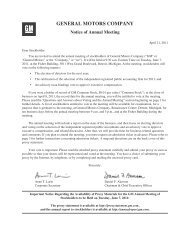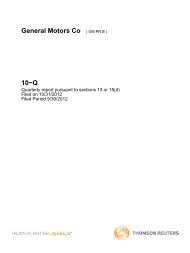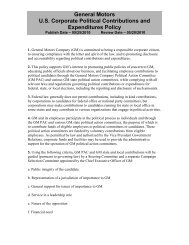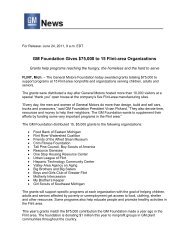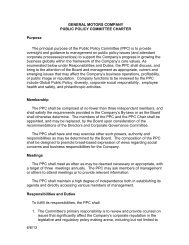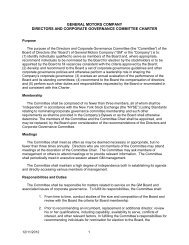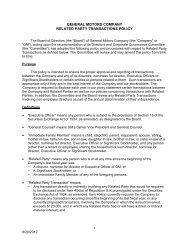Winning with Integrity (code of ethics) - General Motors
Winning with Integrity (code of ethics) - General Motors
Winning with Integrity (code of ethics) - General Motors
Create successful ePaper yourself
Turn your PDF publications into a flip-book with our unique Google optimized e-Paper software.
Fair Competition<br />
<strong>General</strong><br />
August 2, 2011<br />
<strong>Winning</strong> With <strong>Integrity</strong><br />
GM is committed to competing <strong>with</strong>in the law. This section discusses the laws that protect or regulate the competitive<br />
process. Those laws can be complicated, and they vary from country to country. So, when in doubt, consult the Legal<br />
Staff.<br />
Relations With Competitors<br />
One rule is crystal-clear: Never agree <strong>with</strong> a competitor on any element <strong>of</strong> price (including, for example, discounts,<br />
rebates, or incentives) or on what products to develop or to whom we sell. And "agree” doesn’t necessarily mean having a<br />
written contract. Courts sometimes find an illegal agreement based on a conversation, even if the conversation occurred<br />
on the golf course.<br />
� Benchmarking <strong>with</strong> a competitor may be risky, so get legal and business approval before doing it.<br />
� Competitive analysis is vital to GM, but don’t exchange competitive information directly <strong>with</strong> competitors.<br />
Customers, suppliers, or experts may be able to provide marketplace intelligence.<br />
� Avoid discussing sensitive topics like price, costs, or marketing plans at trade association meetings.<br />
For more information on GM policy relating to communicating <strong>with</strong> competitors, please refer to the Competition<br />
Law Policy found on the Global Policy Manual website.<br />
Relations With Dealers, Distributors, and Resellers<br />
It is against GM policy, and illegal in most countries, to force any dealer, distributor, or retailer to sell at a particular price.<br />
We can set a suggested retail price, but each dealer must remain free to set the sale price <strong>with</strong> customers. Consult the<br />
Legal Staff if you have questions about a non-price restriction.<br />
International Consideration<br />
U.S. antitrust laws apply to activity that hurts the competitive process in the U.S. So actions by GM subsidiaries around<br />
the world could be challenged by U.S. authorities. Most countries around the world also have their own competition<br />
laws.<br />
Examples<br />
Insider Trading<br />
In the course <strong>of</strong> our work, we may acquire important information about GM or other companies, which has not yet<br />
become publicly available. Never trade in GM securities or those <strong>of</strong> any other company while in possession <strong>of</strong> material,<br />
nonpublic information. Material information is any information that an investor would reasonably consider important in<br />
making investment decisions. Examples include knowledge <strong>of</strong> acquisitions or divestitures, new product launches,<br />
financial information, production schedules, or management changes.<br />
If you learn something that could reasonably be expected to affect the price <strong>of</strong> GM stock (or the stock <strong>of</strong> another<br />
company), do not buy or sell the stock – or disclose the information to others – until the information has been released to<br />
the public.<br />
16






